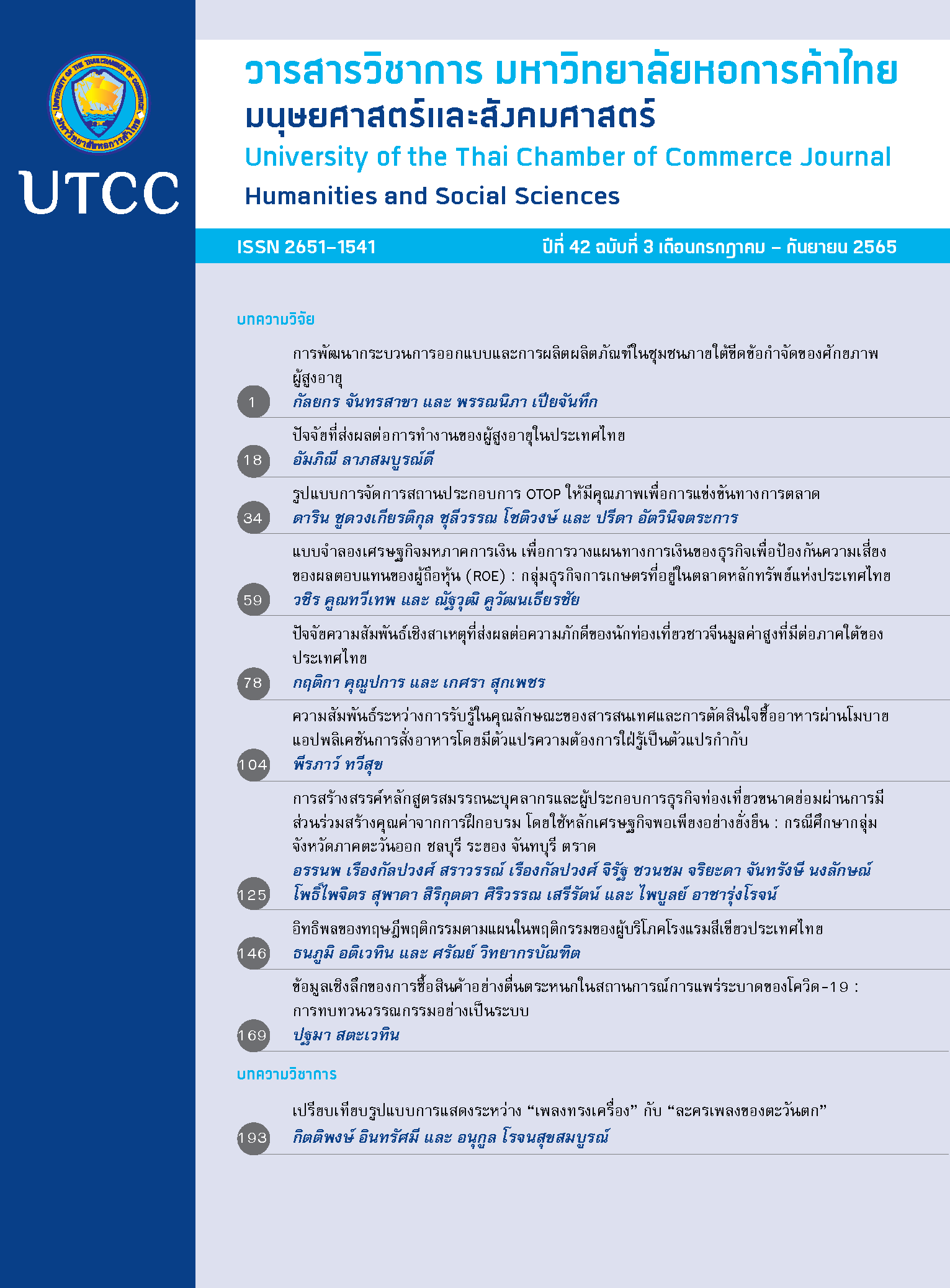creating Competency Development Courses for Small-Sized Tourism Personnel and Entrepreneurs through Value-Based Participation Training by Using Sustainable Sufficiency Economy: Case Study of Eastern Province Group Chonburi, Rayong, Chanthaburi, Trat
Main Article Content
Abstract
The purpose of this research was to 1) study primary data for the creation of competency
development courses for small-sized tourism personnel and entrepreneurs and 2) develop valuebased participation training through training of community personnel and entrepreneurs by using the Sustainable Sufficiency Economy principle. The study found that 1) small-sized tourism personnel and entrepreneurs require workshop training in new business possibilities, development of new products from local raw materials, creation of business plans for government budget requests, online sales, and production of videos to sell products to operate tourism businesses in the community and sell tourism products; 2) workshop training courses were developed based on training needs according to the order of importance of the training needs of tourism personnel and entrepreneurs, participation in decision-making, involvement in building cooperation between small-sized tourism business entrepreneurs and related personnel, stakeholders, community members interested in becoming entrepreneurs, lecturers and researchers with the purpose of creating and designing course content that match with the capabilities of communities according to the Sustainable Sufficiency Economy principle. Accordingly, the operational training courses consisted of (1) a business feasibility
study course according to the procedures for operating small-sized tourism businesses; (2) a
business plan creation course for pioneering small-sized tourism businesses in communities and
tourism products; and (3) a course in the creation of marketing innovations and digital marketing
Article Details

This work is licensed under a Creative Commons Attribution-NonCommercial-NoDerivatives 4.0 International License.
ลิขสิทธิ์ของบทความ
ผลงานที่ได้รับการตีพิมพ์ถือเป็นลิขสิทธิ์ของมหาวิทยาลัยหอการค้าไทย ห้ามมิให้นำเนื้อหา ทัศนะ หรือข้อคิดเห็นใด ๆ ของผลงานไปทำซ้ำ ดัดแปลง หรือเผยแพร่ ไม่ว่าทั้งหมดหรือบางส่วนโดยไม่ได้รับอนุญาตเป็นลายลักษณ์อักษรจากมหาวิทยาลัยหอการค้าไทยก่อน
References
Chompoolong, N. (2002). Methods and procedures for developing local curricula and making school curriculum. Mahasarakham: Apichart Printing.
Cohen, J. M., & Uphoff, N. T. (1980). Participation’s place in rural development: Seeking clarity through specificity. World Development, 8(3), 213-235.
Dale, E. (1973). Management: Theory and practice. New York, NY: McGraw-Hill.
Dessler, G. (1999). Management: Fundamental modern principle & practices (4th ed.). Reston, VA: Reston.
Klinpipat, A., & Tingsapat, C. (2017). A lean coach competency-based training program. TNI Journal of Business Administration and Languages, 5(2), 52-57.
Klongsanoi, T., & Boonsong, S. (2021). The development of professional training on packaging design for community enterprise groups Phrong Akat sub district. Journal of Social Science and Buddhistic Anthropology, 6(6), 255-267.
Office of Strategic Management, Eastern Province Group. (2018). 4-year provincial group development plan (2018-2021) Eastern Province Group. Bangkok: Author.
Pechkong, P., Churintr, P., & Kongrungchok, A. (2017). The relationship between operating factors and expenditure of manufacturing business in Small and Medium Enterprises (SMEs) in Surat Thani Province. Journal of Management Sciences, 4(2), 117-142.
Phengkona, J., Na Thongkaew, B., Raksapol, A., Jittapraphan, B., & Popthawee, T. (2017). Curriculum development in English communication course for community-based tourism in Chumphon Province. Area Based Development Research Journal, 9(1), 38-51.
Siam Commercial Bank. (n.d.). Open up the reason why SMEs can’t reach their dreams. Retrieved March 30, 2022, from https://www.scb.co.th/th/personal-banking/stories/business-maker/sme-not-successful.html
Srisaat, B. (2002). Preliminary research. Bangkok: Suwiriyasas.
Sudsanguan, O. Y., Ngamkanok, S., & Panhoon, S. (2021). The development of training courses to enhance the new entrepreneur in vocational business incubator one stop service center. Interdisciplinary Sripatum Chonburi Journal, 7(2), 113-128.
Sukhothai Thammathirat Open University. (2002). Curriculum for creating research tools in social sciences. Nonthaburi: Author.
Thienbenja, T., & Panjan, W. (2020). The development of a training program for competency enhancement for raising the level of Nong Chok District community products. Ph.D. in Social Sciences Journal, 10(2), 451-463.
Unlock Thai SMEs, how to adapt to grow. (2019, January-February). BOT Magazine, no.1, 20-23. Retrieved from https://www.bot.or.th/broadcast/BOTMagazine/2562/BOT1_62/mobile/index.html#p=22
Winitchaikul, W. (2008). The development of curriculum on the medicinal herb planting for sixth grade students in Bannongbuataklan School, Ta-Khli District, Nakhon Sawan Province (Unpublished master’s thesis). Thepsatri Rajabhat University, Lop Buri.
Yamane, T. (1967). Statistics: An introductory analysis. New York, NY: Harper & Row


